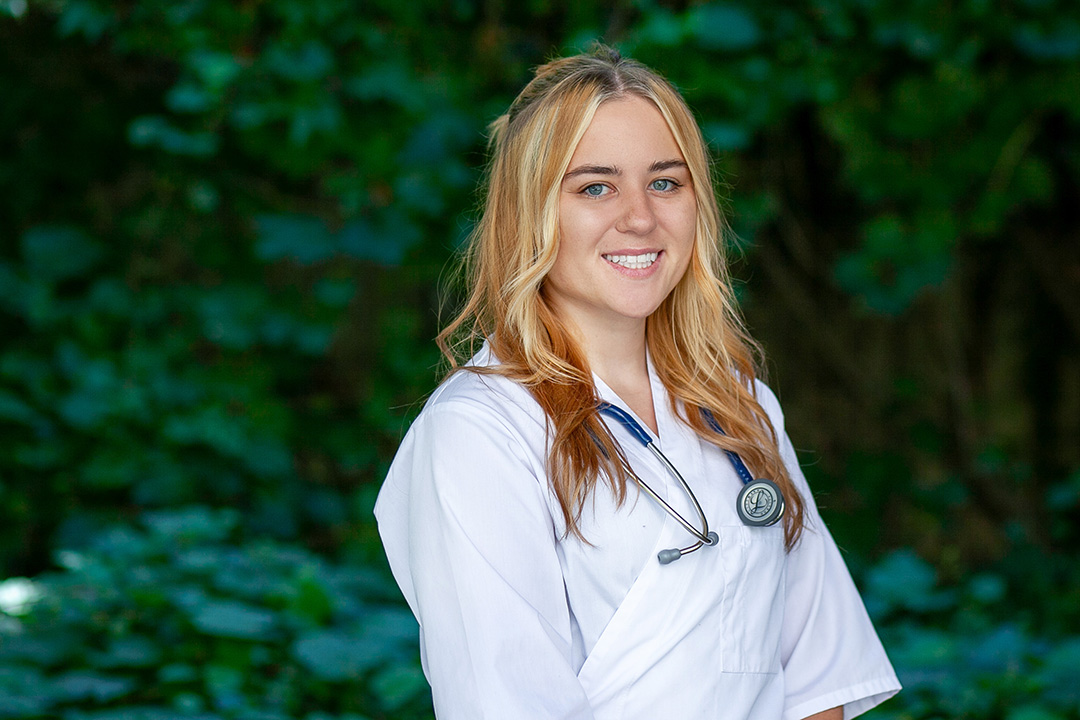
Veterinary immersion
All of Karlynn Dzik’s childhood experiences — the books she read, the videos she watched, the camps she attended — revolved around her desire to study and interact with animals.
By Lynne Gunville“Before even my name, the first words I could write were pet and vet,” says Dzik who began her first year of the Doctor of Veterinary Medicine (DVM) program at the Western College of Veterinary Medicine (WCVM) in August. “My childhood was dominated by hours pretending to be the veterinarian for my Beanie Babies, and all my Barbies were DVMs.”
Dzik had always anticipated a career in veterinary medicine, but as she pursued a Bachelor of Science in Animal Bioscience degree at the University of Saskatchewan (USask), research became another option.
Despite her changing focus, Dzik’s involvement with animals never slowed during her undergraduate years. In addition to volunteering at Corman Park Veterinary Clinic, she and a group of women created Saskatoon Dog Rescue — an organization aimed at bringing animal care services to northern Saskatchewan communities lacking access to veterinary services.
Working with community members, they set up outreach trips that provided veterinary services to benefit the welfare of pets in the communities while supporting northern pet owners. Although the group aspired to keep pets with their owners whenever possible, they also took in surrendered animals and rehomed them through a foster network in Saskatoon.
Once Dzik completed her degree, she continued working with northern communities through research focused on wildlife. She became a research technician with Parks Canada and moved to Churchill, Man., where she began working with the resource conservation team at Wapusk National Park — a setting that soon became her favourite place.
Since Dzik was the park’s only research technician, she worked on various ecology, biology and conservation research projects in all seasons using every mode of transportation.
Dzik particularly enjoyed the chance to work in polar bear country. She received polar bear guard training that taught her how to read their behaviour and respond with actions that maintained a positive relationship between people and the bears.
“Getting to work in an environment where a 1,500-pound bear could be over any ridge was thrilling for someone who is obsessed with wildlife,” says Dzik, adding that the privilege also came with serious responsibilities. “Our work was being conducted in the home of these bears and we had to conduct ourselves to have the lowest impact on the species and avoid conflict with them at all costs.”
In addition to appreciating her work and coworkers, Dzik enjoyed living in Churchill — nicknamed the “Polar Bear Capital of the World.”
“The amazing wildlife only adds to Churchill’s natural beauty,” says Dzik. “In the summer thousands of Beluga whales vacation in the Churchill River Estuary, and getting out on my paddle board to hang out with these friendly and playful whales was one of my favourite things to do.”
Dzik loved her four years in the North, but as she progressed in her position, she realized that she still needed to pursue her deeper interest in physiology and epidemiology. With a career change in mind, Dzik jumped at a chance to work with WCVM alumnus Dr. Jonas Watson (DVM’06) from Grant Park Animal Hospital when he set up a remote clinic in Churchill. That experience reignited her passion for veterinary medicine.
As Dzik looked for ways to develop her education while advancing her future career, she was drawn to the Master of Sustainability (MSs) degree program at USask.
“Living in the North and working on wildlife conservation were the driving factors that pushed me to pursue the MSs program,” explains Dzik. “The Arctic is experiencing climate change faster than any ecosystem on the planet, and personally seeing those impacts on wildlife in Wapusk National Park and on Churchill, the community, really created a passion for sustainability in me.”
As Dzik completed her graduate program, she was inspired by the applicability of the concepts across multiple disciplines, the diversity of her classmates and the amazing professors who made the courses relevant, modern and innovative. She also benefited from the Climate Change Vulnerability Assessment and Adaptation Action Graduate Certificate, a portion of the graduate program that offered relevant applications for the veterinary profession.
Now that Dzik is a WCVM student, she looks forward to sharing those concepts in her role as sustainability representative for her class.
Although Dzik is considering mixed animal practice, she’s open to a possible career in wildlife medicine that includes collaborations on epidemiological research in wild populations. Dzik expects to learn about other new opportunities and practice areas over the next four years, but there’s a good chance that the North will play a role in her future.
“I have fallen in love with the North, and I plan to explore opportunities to work in the North again in my career.”
